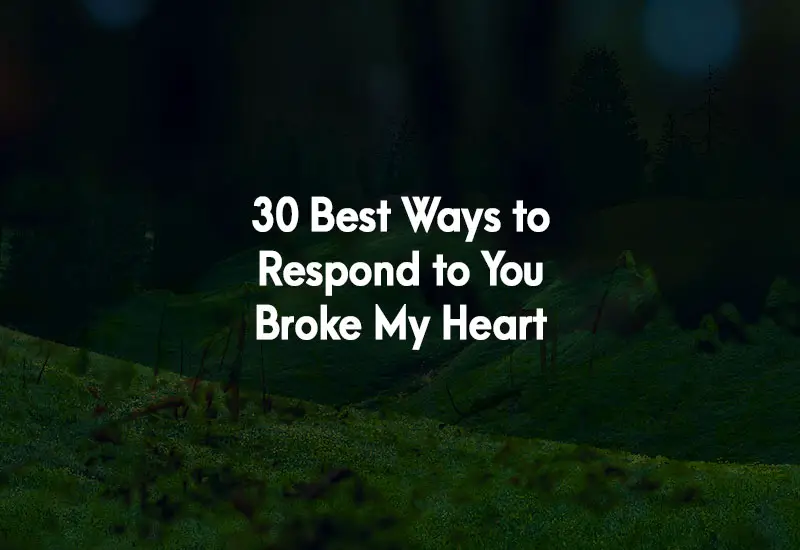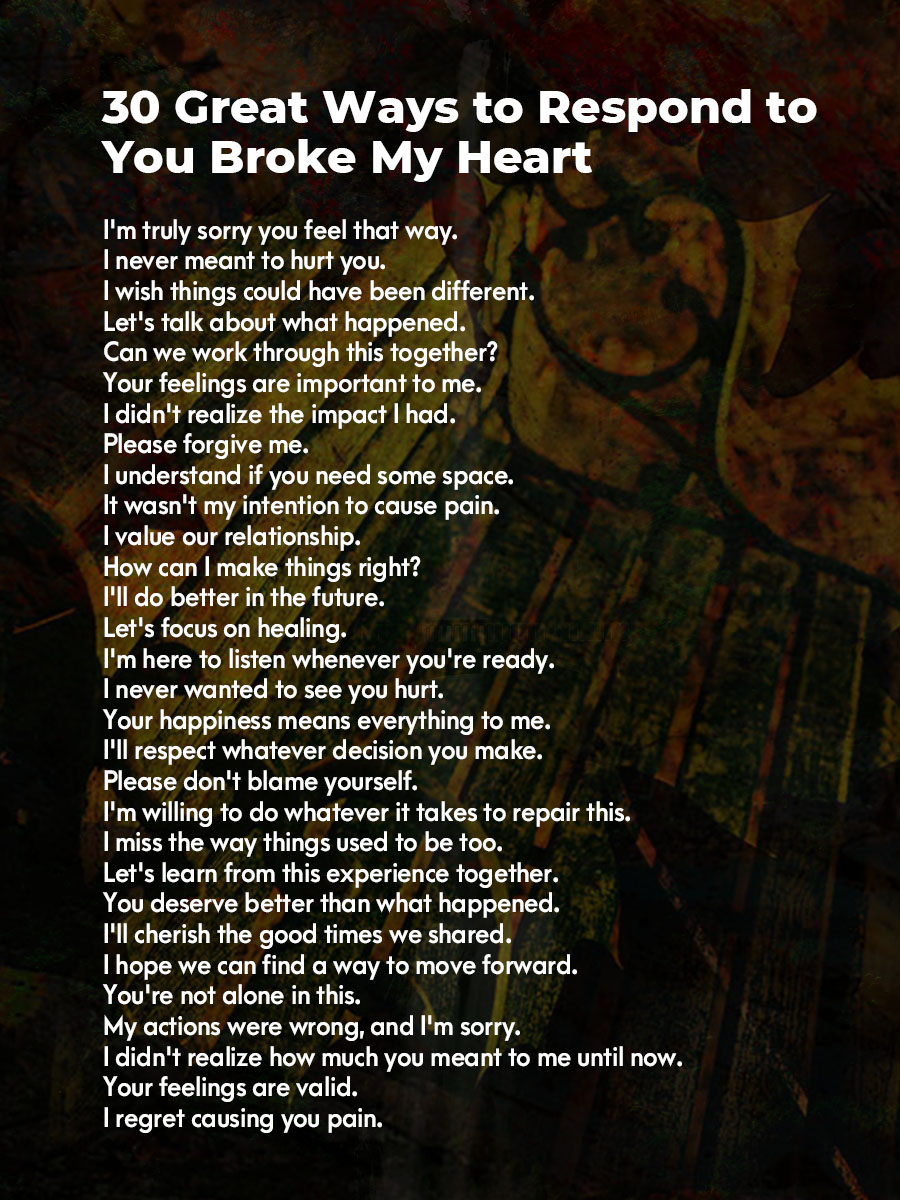When someone says, “You broke my heart,” it can feel really painful. But don’t worry, there are ways to deal with it. In this blog post, we’ll explore some helpful ways to respond when someone tells you this. We’ll talk about how to express your feelings, listen to each other, and find ways to heal. Remember, it’s okay to feel hurt, but it’s also important to take care of yourself and work towards healing. So let’s dive in and discover how to navigate through this tough situation together.

- I’m truly sorry you feel that way.
- I never meant to hurt you.
- I wish things could have been different.
- Let’s talk about what happened.
- Can we work through this together?
- Your feelings are important to me.
- I didn’t realize the impact I had.
- Please forgive me.
- I understand if you need some space.
- It wasn’t my intention to cause pain.
- I value our relationship.
- How can I make things right?
- I’ll do better in the future.
- Let’s focus on healing.
- I’m here to listen whenever you’re ready.
- I never wanted to see you hurt.
- Your happiness means everything to me.
- I’ll respect whatever decision you make.
- Please don’t blame yourself.
- I’m willing to do whatever it takes to repair this.
- I miss the way things used to be too.
- Let’s learn from this experience together.
- You deserve better than what happened.
- I’ll cherish the good times we shared.
- I hope we can find a way to move forward.
- You’re not alone in this.
- My actions were wrong, and I’m sorry.
- I didn’t realize how much you meant to me until now.
- Your feelings are valid.
- I regret causing you pain.
See Also: 28 Outstanding Ways to Respond to “I Appreciate You”
Accepting The Pain
Dealing with a broken heart can be an incredibly painful experience. Accepting the pain is the first step towards healing and moving forward.
Acknowledging The Hurt
Face the reality of the pain you are feeling without suppressing it. Acknowledge your emotions and allow yourself to process them.
Allowing Yourself To Grieve
Give yourself permission to grieve the loss and the pain. Allow yourself to feel the sadness and sorrow without judgment.
Self-care And Healing
Self-care and healing are vital aspects of recovering from a heartbreak. It’s essential to prioritize your emotional well-being and engage in activities that bring comfort during this challenging time.
Caring For Your Emotional Well-being
Self-care involves taking deliberate action to preserve and improve your mental, emotional, and physical health. It’s time to focus on yourself and engage in activities that nurture your soul.
- Practice mindfulness and meditation to calm your mind and ease emotional distress.
- Express your emotions through journaling or creative outlets like art or music.
- Surround yourself with a support system of friends and family who uplift and validate your feelings.
- Seek professional help from a therapist or counselor to process your emotions and gain perspective.
Engaging In Activities That Bring Comfort
Finding comfort in activities that bring joy and solace can aid in the healing process.
- Indulge in self-soothing activities such as taking long baths, enjoying nature walks, or practicing gentle yoga.
- Engage in hobbies and interests that ignite passion and provide an escape from heartache.
- Focus on self-improvement through exercise, healthy eating, and adequate rest to enhance your overall well-being.
As you strive to heal, remember to be patient and compassionate with yourself. Embracing self-care and engaging in comforting activities can help mend your broken heart and promote inner healing.
Seeking Support
When someone breaks your heart, seeking support from friends or a therapist can help. Express your feelings and process the pain to heal and move forward positively. Communication and self-care are key in navigating emotional turmoil effectively.
Talking To Trusted Friends Or Family
When heartbreak strikes, it’s important to seek support from those we trust. Talking to trusted friends or family can provide a much-needed outlet for our emotions.
Expressing our feelings to someone who knows us well can be incredibly cathartic. They can provide a listening ear, offering comfort and validation, helping us process our pain.
Whether it’s over a cup of coffee or a heartfelt phone call, opening up to loved ones can alleviate some of the burden we carry. Knowing that someone cares and understands can bring a sense of relief and help us heal.
Here are a few tips to make the most of seeking support from trusted friends or family:
- Choose the right person: Seek out someone who is empathetic, non-judgmental, and genuinely supportive. This person should be someone you feel comfortable sharing your deepest thoughts and emotions with.
- Be honest and vulnerable: Don’t hesitate to express your true feelings. Letting down your guard and being vulnerable can deepen the connection and understanding between you and your loved one.
- Listen and accept: Allow your trusted friend or family member to share their thoughts, feedback, and advice. Remember that they are there to support you, so be open to their perspective.
- Set boundaries: Communicate your needs and boundaries clearly. Let your loved ones know what kind of support you are looking for and what you might need from them during this challenging time.
- Recognize their limitations: While friends and family can offer valuable support, they may not have all the answers. Keep in mind that they are not professionals, and their advice might be biased. Be selective with the guidance you choose to follow.
Consider Professional Counseling
When you find yourself struggling to cope with heartbreak, it might be beneficial to consider professional counseling. A therapist can provide a safe and non-judgmental space for you to work through your emotions.
Professional counselors are trained to help individuals navigate the complexities of heartbreak. They can provide guidance, coping strategies, and techniques to help you heal and move forward.
Reaching out to a professional does not mean you are weak or incapable. It’s a brave step towards self-care and personal growth. Seeking therapy can offer a fresh perspective, helping you gain insights into your emotions and behaviors.
Here are a few reasons why professional counseling might be a good option:
- Expert guidance: Therapists have the knowledge and experience to help you process your emotions in a healthy and productive manner. They can guide you towards growth and self-discovery.
- Confidentiality: Therapy sessions are confidential, providing you a safe space to share your deepest fears and vulnerabilities. This confidentiality allows for a greater sense of security and trust.
- Unbiased support: Unlike friends or family, therapists are impartial and objective. They can provide unbiased support, helping you gain clarity and perspective.
- Customized approach: Therapists tailor their approach to meet your unique needs. They can provide personalized strategies and techniques to help you navigate your healing journey.
- Emotional release: Counseling sessions offer an opportunity for emotional release without judgment. Venting your pain, frustrations, and sadness in a safe environment can be incredibly healing.
Reflection And Growth
In times of heartbreak, it’s essential to find ways to heal and move forward. One powerful method to do so is through reflection and growth. By taking the time to truly understand the lessons from a broken heart and focusing on self-improvement, you can transform this painful experience into an opportunity for personal development and empowerment.
Finding Lessons In The Experience
Reflecting on a broken heart can unveil valuable lessons that serve as a stepping stone towards personal growth. Consider making a table to identify the insights gained:
| Lessons learned from a broken heart |
|---|
| Trusting blindly can lead to disappointment |
| Recognizing red flags is crucial for self-protection |
| Communication is vital in fostering a healthy relationship |
This simple exercise allows you to visually organize your thoughts and serves as a handy reference point when navigating future relationships. Each lesson becomes a gem of wisdom to carry forward, helping you avoid repeating past mistakes.
Working On Self-improvement
While it may be tempting to dwell on the pain of a broken heart, channeling your energy towards self-improvement can lead to healing and growth. Here are a few strategies to consider:
- Engaging in self-care: Prioritize activities that bring you joy and provide comfort. It may include practicing mindfulness, exercising, reading, or spending time with loved ones who uplift your spirits.
- Investing in personal hobbies: Rediscover your passions or explore new interests. Engaging in activities that fuel your creativity and bring you fulfillment can help rebuild your sense of self and confidence.
- Expanding your support network: Surround yourself with positive and supportive individuals who genuinely care for your well-being. Share your experiences, seek advice, or simply lean on them for emotional support.
- Seeking professional help: When needed, don’t hesitate to reach out to a therapist or counselor who can guide you through the healing process. They can provide valuable tools and techniques tailored to your specific needs.
Remember, healing takes time and effort. By committing to self-improvement, you are taking an active role in shaping a brighter future, one that is founded on personal growth, resilience, and self-love.
Moving Forward
When your heart is broken, it can feel like the world has come crashing down. The pain and emotions that come with heartbreak can be overwhelming, and it may seem difficult to move forward. However, there are healthy ways to approach the healing process and pave the way for a brighter future. Let’s take a look at some constructive ways to embrace the future and open yourself up to love again.
Embracing The Future With Hope
After experiencing heartbreak, it’s normal to feel disheartened and unsure about what lies ahead. However, it’s important to understand that the future holds promise and hope. Taking each day as it comes and maintaining a positive outlook can help in the healing process. You can look forward to new experiences, personal growth, and the possibility of finding a love that’s even more fulfilling than before.
Opening Yourself Up To Love Again
Reopening your heart after a break-up can be a challenging endeavor, but it’s crucial in allowing yourself the chance to experience love once more. Create space for new connections and relationships. Practice self-care and prioritize self-love. Be open to new experiences and embrace the prospect of a profound and wonderful love in the future.

More Additional Different Response
- I’ll give you the time you need to heal.
- I’ll always be here for you, no matter what.
- I never wanted to let you down.
- Let’s focus on building a stronger future together.
- I’ll work on being more understanding.
- Your trust means everything to me.
- I’ll do my best to earn it back.
- I hope we can find a way to reconcile.
- I’ll make changes to ensure this doesn’t happen again.
- I didn’t realize the depth of your feelings.
- I’ll be patient while you process everything.
- Let’s talk about how we can move forward positively.
- I’ll respect your boundaries.
- I’m committed to making things right.
- I never wanted to hurt you intentionally.
- Let’s focus on the positives as we work through this.
- Your happiness is paramount to me.
- I’ll take responsibility for my actions.
- I’ll do my best to understand your perspective.
- I’ll always carry the weight of what I’ve done and strive to be better.
See Also: 30 Flirty Responses to I Need You
Conclusion
In love, handling heartbreak is inevitable. Your response matters. Choose self-care, seek support, and allow healing. Embrace positivity and look towards a brighter future. Acknowledge the pain, but don’t dwell on it. As you navigate through, remember, healing takes time.
Be kind to yourself and stay hopeful.









